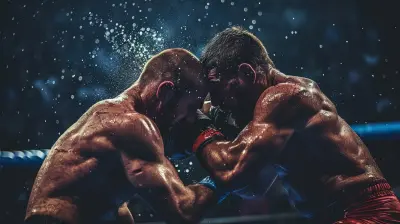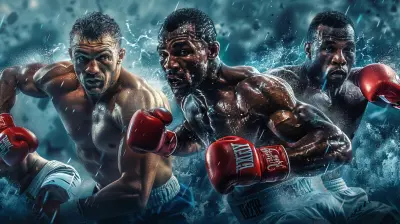Guaranteed Money vs. Incentives: The Battle in Modern Sports Contracts
10 December 2024
When we think of athletes signing multi-million-dollar contracts, it’s easy to picture them living in luxury, enjoying life without much financial worry. But have you ever stopped to wonder how those contracts are actually structured? It’s not always as simple as “Here’s $100 million, go play.” Today, contracts in sports come down to two big ideas: guaranteed money and incentive-based compensation.
Both guaranteed money and incentive-laden contracts have their pros and cons. And for athletes, teams, and even agents, these terms are not just numbers on a piece of paper—they can define careers, shape team strategies, and influence the very nature of competition.
So, let’s dive right in and break down this battle that’s brewing in modern sports contracts.
What Is Guaranteed Money?
The Safety Net Every Athlete Wants
Guaranteed money is exactly what it sounds like—money that’s promised to the athlete, no matter what. Whether they perform well, get injured, or even if they’re cut from the team, that cash is locked in. It’s the ultimate safety net.In a world where athletes push their bodies to the limit, having a guaranteed paycheck can be a massive relief. Just think about it—if you were an athlete risking injury every time you stepped onto the field, wouldn’t you want to know that your financial future is secure no matter what?
For example, let’s look at NFL contracts. NFL players often face short careers due to the brutal physicality of the game. A torn ACL, concussion, or any other serious injury can end a career in a heartbeat. That’s why guaranteed money has become such a vital part of modern NFL contracts. It ensures that even if a player's body gives out, their bank account won’t.
Examples of Guaranteed Money in Contracts
Take Patrick Mahomes, quarterback for the Kansas City Chiefs. He signed a 10-year, $450 million contract, but not all of that is guaranteed. However, a significant portion of it—around $141 million—is guaranteed, meaning that he’s set, even if his performance dips or his career gets cut short due to injury.In the NBA, guaranteed contracts are even more common. Players like LeBron James or Stephen Curry are guaranteed every penny of their contracts, regardless of performance or injury. This guarantees them financial security and reduces the pressure to constantly perform at a superhuman level.
Incentive-Based Contracts: The "Show Me" Deals
Money Earned Through Performance
On the other side of the spectrum, we have incentive-based contracts. These deals require athletes to hit specific milestones to earn certain portions of their paycheck.Think of it like a commission-based job. You get paid a base salary, but if you want the big bucks, you have to hit your targets. In sports, these targets could be anything from the number of games played, points scored, postseason appearances, or awards won.
For teams, this type of contract structure can be a smart move. It gives players an extra nudge to perform at their best while protecting the team from overpaying for underperforming athletes. It’s a “prove it” deal—you get rewarded when you live up to the hype.
Incentive Example: NFL and MLB
Take the NFL’s J.J. Watt as an example. In some of his contracts, Watt had clauses where he could earn additional bonuses if he reached a certain number of sacks in a season. If he hit his target, great—extra cash in the bank. If not, well, he’d still get his base salary, but the bonus money would be left on the table.In Major League Baseball (MLB), incentives often come in the form of performance bonuses (like hitting a certain number of home runs) or awards (like winning the MVP). Josh Donaldson, for example, had an incentive in his contract where he earned extra money each time he reached a particular number of plate appearances.
Incentive-based contracts can be a win-win for both the team and the athlete. Teams only pay top dollar when players meet expectations, and athletes get the chance to make more money if they perform well. But, of course, these contracts come with their own set of challenges.
The Pros and Cons: Guaranteed Money vs. Incentives
The Case for Guaranteed Money
From an athlete’s perspective, guaranteed money is the dream. It offers security, and in a profession where the risks of injury are constant, that’s priceless. Knowing you’ll be paid no matter what allows athletes to focus more on their game and less on the "what ifs."Plus, guaranteed money sends a clear message: the team believes in you. If a franchise is willing to commit millions to a player regardless of future performance, that's a huge vote of confidence.
However, there’s a flip side. Teams can find themselves in trouble if they commit too much guaranteed money to underperforming players. If a star player gets injured or fails to live up to expectations, teams are still on the hook financially. This can hurt a franchise’s salary cap and limit their ability to bring in new talent.
Take Albert Pujols as an example. When the Los Angeles Angels signed him to a 10-year, $240 million deal, most of that money was guaranteed. As Pujols' production waned in the final years of the deal, the Angels were still obligated to pay him a hefty sum, even though his performance didn't justify it.
The Case for Incentives
On the other hand, incentives can be a great motivator. Players often perform better when there’s more at stake. If you know you’ll make an extra $500,000 for reaching 1,000 rushing yards, you’re going to push yourself that much harder. It’s like dangling a carrot in front of a horse—it pushes them to go the extra mile.Incentive-based deals also protect teams from overpaying players who don’t deliver. Instead of being stuck with a hefty guaranteed salary for a player who’s underperforming, teams can adjust pay based on actual results.
However, for athletes, incentive-based contracts can feel like a double-edged sword. Sure, you can make more money, but what happens if you get injured? Imagine being one touchdown away from a huge bonus, only to get sidelined in the last game of the season. It’s a risk-reward scenario that can cause a lot of stress.
The Evolution of Sports Contracts
A Shift in Power Dynamics
Contracts in sports have evolved dramatically over the years. Back in the day, most contracts were straightforward: a fixed salary for a fixed number of years. But as sports leagues grew in popularity and revenue skyrocketed, contracts became more complex.Today, athletes and their agents are savvier than ever, seeking deals that maximize both guaranteed money and incentives. It's no longer about just getting paid—it's about structuring contracts that reflect the player's value while also considering the risks involved.
In the NBA, for example, we’re seeing more players sign shorter contracts with opt-out clauses, allowing them to become free agents and negotiate new deals more frequently. This gives players more control over their careers and earning potential.
Meanwhile, in the NFL, which is notorious for non-guaranteed contracts, we’re seeing more players push for guaranteed money, much like their NBA counterparts. Kirk Cousins, for instance, made headlines when he signed a fully guaranteed contract with the Minnesota Vikings—a rarity in the NFL.
The Role of Agents and Negotiations
A Balancing Act
Behind every big sports contract, there’s an agent working hard to get the best deal for their client. These agents have to balance the demand for guaranteed money with the potential for lucrative incentives.Agents play a critical role in finding the right balance. They need to understand their client's value, the team’s financial constraints, and the risks involved. It’s a delicate dance, and getting it wrong can have lasting consequences for both the player and the team.
For players, having a good agent can mean the difference between financial security and uncertainty. For teams, negotiating contracts that protect their long-term interests while still attracting top talent is a tricky game.
What’s Better: Guaranteed Money or Incentives?
The Final Verdict
So, which is better—guaranteed money or incentives? Well, it depends. For athletes, guaranteed money offers peace of mind and financial security. But for teams, incentives can ensure they’re getting the most bang for their buck.In reality, most modern sports contracts are a mix of both. There’s often a guaranteed base salary with performance incentives sprinkled in. This structure allows both parties to share the risk and reward.
At the end of the day, it’s all about finding the right balance. Too much guaranteed money, and a team could find itself stuck with an underperforming player. But too many incentives, and a player might feel undervalued or stressed about meeting performance goals.
It’s a delicate dance, and as sports evolve, so too will the contracts. The battle between guaranteed money and incentives isn’t going away anytime soon—it’s just getting started.
all images in this post were generated using AI tools
Category:
Sports ContractsAuthor:

Ruben McCloud
Discussion
rate this article
16 comments
Andrea Hayes
Interesting perspective! Love the debate on incentives!
March 26, 2025 at 9:01 PM

Ruben McCloud
Thank you! I'm glad you found it engaging—it's a crucial topic in modern sports economics!
Cruz King
In the high-stakes arena of modern sports contracts, the clash between guaranteed money and performance incentives reflects the true spirit of competition. It’s not just about financial security; it’s about pushing boundaries, embracing challenges, and fueling ambition. Let athletes thrive on both rewards and risks, igniting passion on and off the field!
January 30, 2025 at 5:54 AM

Ruben McCloud
Thank you for your insightful comment! Balancing guaranteed money and performance incentives indeed shapes the competitive landscape, motivating athletes to excel while ensuring financial security.
Layne Snyder
Great insights on the evolving dynamics of sports contracts! The balance between guaranteed money and incentives truly shapes player motivation and team strategies. Looking forward to seeing how this impacts future negotiations and player performance!
January 26, 2025 at 8:00 PM

Ruben McCloud
Thank you for your insightful comment! It's fascinating to see how these dynamics will shape the future of player negotiations and performance.
Cassian McKinstry
This article compellingly highlights the tension between guaranteed money and performance incentives in sports contracts, illustrating how financial structures impact player motivation, team dynamics, and overall league competitiveness in modern athletics.
January 19, 2025 at 11:40 AM

Ruben McCloud
Thank you for your insightful comment! I appreciate your recognition of the complex dynamics at play in sports contracts. Your perspective underscores the critical balance between financial security and motivation in shaping player and team performance.
Whitney McKeever
Contracts are like a game of chess: strategic moves, unexpected gambits, and the occasional player throwing a tantrum over a missed bonus. Checkmate, agents!
January 14, 2025 at 1:21 PM

Ruben McCloud
Absolutely! Contracts do require strategic thinking and adaptability, much like chess. Understanding the balance between guaranteed money and incentives can truly determine the game's outcome for athletes and teams alike.
Joy Jackson
This article brilliantly highlights the ongoing debate between guaranteed money and performance incentives in sports contracts, showcasing the evolving priorities of athletes and teams.
January 12, 2025 at 4:15 AM

Ruben McCloud
Thank you! I'm glad you found the article insightful in exploring the complex dynamics of guaranteed money versus performance incentives in sports contracts.
Kaleb Barron
Navigating the complexities of sports contracts can be challenging. It's vital to consider both players' financial security and their drive for performance—each has its own merits.
January 8, 2025 at 1:19 PM

Ruben McCloud
Absolutely, striking a balance between guaranteed money and performance incentives is crucial for both player welfare and maximizing competitiveness. Each side brings valuable perspectives to the table.
Thalwen Mullen
In the great circus of sports contracts, guaranteed money and incentives are like a tightrope walker and a trampoline—one seeks stability, the other craves adrenaline! Can we just get them both a giant inflatable unicorn to bounce on while we watch the drama unfold? 🦄🏀
January 3, 2025 at 7:50 PM

Ruben McCloud
I love that analogy! Balancing guaranteed money with performance incentives is indeed a thrilling act—let's hope the unicorn helps them land safely! 🦄
Mercy Sharpe
Guaranteed money is like a warm blanket; incentives are that pesky cat that keeps knocking it off!
December 31, 2024 at 3:55 AM

Ruben McCloud
That's a clever metaphor! It highlights the comfort of guaranteed money versus the unpredictable nature of incentives in sports contracts.
Opal Love
Interesting perspective on contract dynamics!
December 24, 2024 at 8:04 PM

Ruben McCloud
Thank you! I'm glad you found it interesting. The balance between guaranteed money and incentives is crucial in shaping player motivation and team dynamics.
Ariella Shaffer
In the fierce arena of sports contracts, the debate between guaranteed money and incentives embodies the heart of competition. Athletes thrive on proving their worth, yet security is paramount. This clash not only shapes careers but also redefines the future of sports—where ambition meets accountability.
December 15, 2024 at 5:52 AM

Ruben McCloud
Thank you for capturing the essence of this complex issue! Striking the right balance between security and performance-based incentives is indeed crucial for both athletes and the evolving landscape of sports contracts.
Riven Coleman
Great insights! This discussion on guaranteed money versus incentives is so relevant. Excited to see how it shapes the future!
December 13, 2024 at 5:24 AM

Ruben McCloud
Thank you! I'm glad you found the discussion relevant—it's a pivotal topic that will certainly impact the future of sports contracts.
Soleil Klein
Great article! You’ve effectively highlighted the evolving dynamics between guaranteed money and incentives in sports contracts. It’s fascinating to see how these elements impact player motivation and team strategies in today’s competitive landscape. Looking forward to more insights!
December 11, 2024 at 7:53 PM

Ruben McCloud
Thank you! I'm glad you found the article insightful. Stay tuned for more discussions on this topic!
Bellamy Nelson
Great article! The tug-of-war between guaranteed money and incentives in contracts really showcases how teams and players navigate risks and rewards. It’s fascinating to see how this impacts player performance and team dynamics. Can’t wait to see how this plays out in upcoming seasons! Keep up the great work!
December 11, 2024 at 4:54 AM

Ruben McCloud
Thank you for your insightful comment! I'm glad you found the article engaging. It will be interesting to watch how this dynamic evolves in future seasons!
Buzz O'Neal
What a fascinating discussion! The tug-of-war between guaranteed money and performance incentives adds excitement not just for players but also for fans. It’s thrilling to see how these strategies shape the future of sports contracts. Can’t wait to see where this leads us!
December 10, 2024 at 8:11 PM

Ruben McCloud
Thank you! It's indeed an intriguing dynamic that impacts both player motivation and fan engagement. Excited to see how it evolves!
Robert Campbell
“Why do sports contracts sound like a game show? ‘Congratulations! You’ve won a guaranteed million! But wait, if you score three touchdowns and juggle, you might get a bonus! Let the games begin!”
December 10, 2024 at 5:29 AM

Ruben McCloud
Sports contracts often resemble game shows because they mix guaranteed salaries with performance-based incentives, creating an entertaining and competitive atmosphere for players and fans alike.
MORE POSTS

How Doping Has Changed the Landscape of Competitive Cycling

The Rise of Team-Friendly Contracts in the Age of Superstars

How Yoga Complements Strength Training
The Most Iconic Wrestling Finishing Moves and Their Origins

The Evolution of Athlete Fashion: From Locker Rooms to Runways

Athletes Using Their Platform for a Greater Cause in Charity Games

How to Stay Focused Under Pressure in a Wrestling Match

Breaking Boundaries: Athletes Who Changed the Face of Their Sports

How to Exploit a Numerical Advantage in Attack

Exploring the Importance of Team Roles and Responsibilities